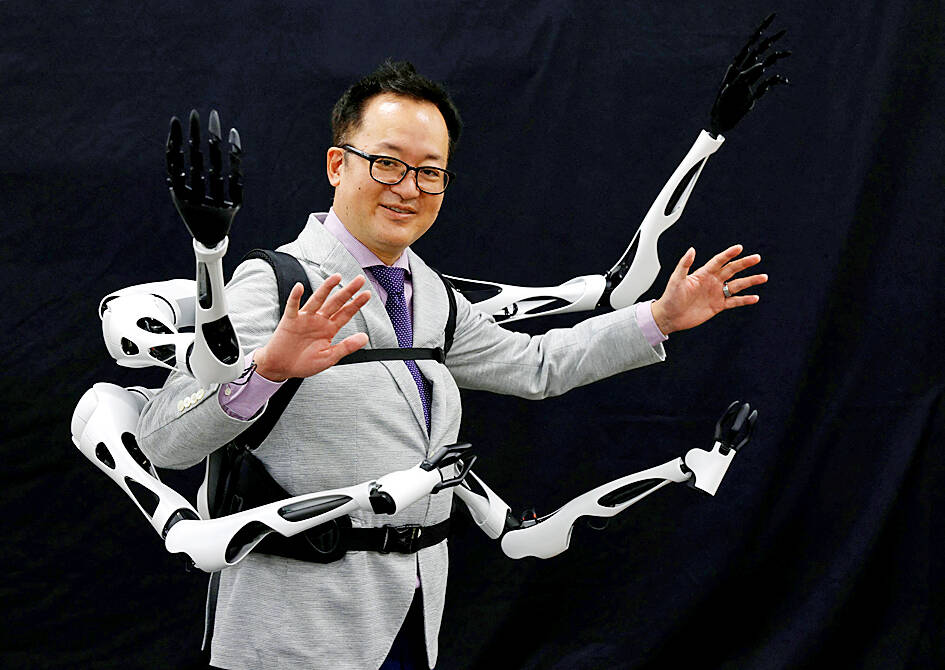What would society look like if cyborg body parts were freely available for use like roadside rental bicycles? Masahiko Inami’s team at the University of Tokyo aim to find out by creating wearable robotic arms.
Inami’s team is developing a series of technologies rooted in the idea of “izai,” a Japanese term that he says roughly denotes autonomy and the freedom to do as one pleases.
The aim is to foster something like the relationship between musician and instrument, “lying somewhere between a human and a tool, like how a musical instrument can become as if a part of your body.”

Photo: Reuters
Inami, a professor of information somatics, said he was inspired by traditional Japanese puppetry and a quasi-horror short story by novelist Yasunari Kawabata about a man who borrows a young woman’s arm and proceeds to spend the night with it.
“This is absolutely not a rival to human beings, but rather something that helps us do as we please, like a bicycle or e-bike. It supports us and can unlock creativity,” Inami said.
A promotional video for the “Jizai Arms” shows two ballet dancers performing a routine with robotic arms protruding from their backs and torsos — the humans and machines moving in concert.
The dancers ultimately embrace, cyborg arms included.
Some wearers grow attached to the arms after some time, Inami said.
“Taking them off after using them for a while feels a little sad. That’s where they’re a little different to other tools,” he said.
However, the potential goes beyond turning a novelist’s fantasy into reality, such as helping in search-and-rescue missions, he said.
“In the future we might see wings growing out of people’s backs, or drones attached to people... Maybe someone will come up with a sport that requires six arms or invent a new type of swimming,” Inami said.

Thousands gathered across New Zealand yesterday to celebrate the signing of the country’s founding document and some called for an end to government policies that critics say erode the rights promised to the indigenous Maori population. As the sun rose on the dawn service at Waitangi where the Treaty of Waitangi was first signed between the British Crown and Maori chiefs in 1840, some community leaders called on the government to honor promises made 185 years ago. The call was repeated at peaceful rallies that drew several hundred people later in the day. “This government is attacking tangata whenua [indigenous people] on all

The administration of US President Donald Trump has appointed to serve as the top public diplomacy official a former speech writer for Trump with a history of doubts over US foreign policy toward Taiwan and inflammatory comments on women and minorities, at one point saying that "competent white men must be in charge." Darren Beattie has been named the acting undersecretary for public diplomacy and public affairs, a senior US Department of State official said, a role that determines the tone of the US' public messaging in the world. Beattie requires US Senate confirmation to serve on a permanent basis. "Thanks to

RIGHTS FEARS: A protester said Beijing would use the embassy to catch and send Hong Kongers to China, while a lawmaker said Chinese agents had threatened Britons Hundreds of demonstrators on Saturday protested at a site earmarked for Beijing’s controversial new embassy in London over human rights and security concerns. The new embassy — if approved by the British government — would be the “biggest Chinese embassy in Europe,” one lawmaker said earlier. Protester Iona Boswell, a 40-year-old social worker, said there was “no need for a mega embassy here” and that she believed it would be used to facilitate the “harassment of dissidents.” China has for several years been trying to relocate its embassy, currently in the British capital’s upmarket Marylebone district, to the sprawling historic site in the

UNDAUNTED: Panama would not renew an agreement to participate in Beijing’s Belt and Road project, its president said, proposing technical-level talks with the US US Secretary of State Marco Rubio on Sunday threatened action against Panama without immediate changes to reduce Chinese influence on the canal, but the country’s leader insisted he was not afraid of a US invasion and offered talks. On his first trip overseas as the top US diplomat, Rubio took a guided tour of the canal, accompanied by its Panamanian administrator as a South Korean-affiliated oil tanker and Marshall Islands-flagged cargo ship passed through the vital link between the Atlantic and Pacific oceans. However, Rubio was said to have had a firmer message in private, telling Panama that US President Donald Trump